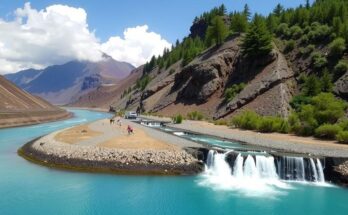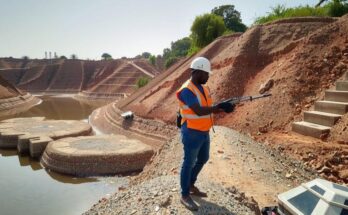Brazil has signed a memorandum of understanding with Argentina to import natural gas from the Vaca Muerta formation, aiming for 30 million cubic meters per day by 2030. This initiative highlights economic collaboration amidst political tensions between the countries. Key infrastructure and transportation logistics are being evaluated to ensure the viability of the gas supply.
Brazil is progressing in its plans to import natural gas from Argentina’s Vaca Muerta formation, despite the complexity of their political relationship. Recently, Brazil’s Energy Ministry signed a memorandum of understanding with Argentina to assess infrastructure requirements aimed at boosting natural gas supplies. By 2030, Brazil anticipates importing up to 30 million cubic meters per day, which is integral to its broader strategy for stimulating industrial growth. Despite ongoing political tensions between Brazilian President Luiz Inácio Lula da Silva and Argentine President Javier Milei, this agreement illustrates how economic collaborations can transcend such challenges. The memorandum establishes a bilateral working group tasked with determining the economic viability of supplying Argentine natural gas to Brazil. Argentina, in turn, seeks to expand its market for substantial gas reserves to enhance production. According to estimates, Brazil will receive two million cubic meters of gas daily from Argentina’s Neuquén and Río Negro provinces by early next year, potentially rising to ten million cubic meters over the subsequent three years. The gas sourced from Vaca Muerta may cost approximately half of the current average price of 14 USD per BTU. Initially, gas transportation will utilize a pipeline traversing Bolivia, although resolving transportation costs remains a significant hurdle. Additionally, alternative transportation infrastructures such as new pipelines through Argentina or Paraguay, alongside liquefied natural gas exports, are considerations for expanding Argentine gas flow to Brazil. This initiative not only reinforces the economic ties between Brazil and Argentina but also underscores Brazil’s commitment to diversifying its energy sources in a rapidly changing geopolitical climate.
The article discusses Brazil’s strategic move to import natural gas from Argentina, specifically from the Vaca Muerta formation—one of the largest shale gas reserves globally. The initiative arises from considerations to enhance Brazil’s energy security and stimulate industrial growth amidst complicated political dynamics between the two nations. Historically, both countries have been intertwined economically, but political disagreements have posed challenges to their bilateral relations. This latest agreement signifies a turning point where economic interests may prevail over political disputes.
In summary, Brazil’s decision to import natural gas from Argentina represents a significant advancement in their bilateral economic relationship, showcasing the ability of business agreements to persevere despite political frictions. The anticipated increase in gas supply is expected to play a pivotal role in Brazil’s industrial development. Furthermore, the ongoing discussions about transportation logistics indicate both nations are actively seeking solutions to maximize the potential benefits of this cooperation.
Original Source: www.batimes.com.ar




